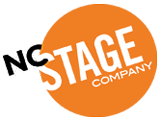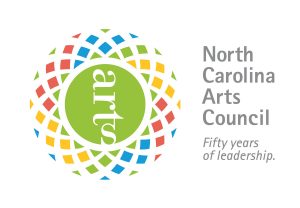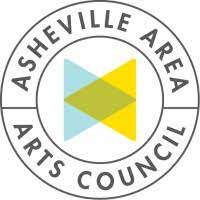Welcome to A Defining Moment, a 3-part podcast series where we ask our artists about their experiences in 2020 and the state of theatre beyond.
This week we sat down with Helen Garcia-Alton, lighting designer of Jeeves Saves the Day (2020).
Prefer to read? See the transcript below.
Taylor Beyer: Hi! My name is Taylor Beyrer and I am the Audience Relations Manager for North Carolina Stage Company. I’m here today with Helen, who’s going to tell you a little bit about herself so let’s get started. So Helen, hi, introduce yourself.
Helen Garcia-Alton: Hi my name is Helen Garcia-Alton and I’m a third year graduate candidate in lighting design at the University of Tennessee. I designed Jeeves Saves the Day at NC Stage back in 2019. Wait, it was 2020 wasn’t it?
TB: Yes, it was 2020
HGA: Before all of this happened. Which feels like 300 years ago.
TB: Most definitely. So you are still in school yes?
HGA: Yes, I’m in my last year of grad school. Before grad school I was a professional lighting designer in Baltimore, Maryland for 4 years.
TB: And how has your educational experience changed, in what ways are you and your program adapting?
HGA: Well, it’s changed a lot. First of all, we’ve got a new space that we’re all in as offices but many of us aren’t here because of COVID. We have to be much more careful when there are people in the space. But the biggest thing that’s changed is we don’t have a season here at the Clarence Brown Theatre. Which means that as third year graduate students our final big thesis productions have all been cancelled. And my spring production last year was also cancelled, so I’ll be graduating having designed Exit Pursued by a Bear, which was in a black box, but I’ve lost – at this point – I’ve lost three major designs in the program because of that. So we’re having our final semester supplemented with some theoretical projects – our faculty has graciously gotten us some very nice professional directors from across the country to work with us and we’re getting that experience that, in a way, is kind of beneficial because we’re going to graduate hopefully with those contacts, with those new directors, and have a better idea of how to work right now in this kind of strange time where we have to be far apart.
TB: What projects were you working on in March? I guess in January/February you were working on Jeeves and then is there anything you were working on when things kind of shut down?
HGA: Right before things shut down, I was actually in Nashville. I have a national tour with a company called New Works. It’s a show called Stirring the Waters Across America and it’s about how the civil rights movement isn’t over yet and that piece was – I think it was maybe two weeks before Nashville was declared a hot zone and I had to drive back and pick up all of this scenery that was left behind. I was like “oh my goodness,” and I was told to quarantine by the university because I was in the hot zone picking up this table. So that happened, then I was working on A Gentleman’s Guide to Love and Murder which would have been the Clarance Brown Theatre’s closing show of the season. And that got shut down the day before rehearsals started. So it was really quick – nope nope nope nope nope. This fall, Clarence Brown was supposed to have Always Patsy Cline and Book of Will happen as part of the season and both of those got cancelled, of course, as well.
TB: And have you worked on any projects since, through school or professionally?
HGA: Actually yes I am currently working on a project, it’s a new project. It’s kind of a Zoom theatre piece. It’s called The Hacking of Nazar Scorge and it was written by Patrick Lansky who is actually our production stage manager at the Clarence Brown Theatre. We were talking about how we were missing that collaboration and wanted it, even if it was online across the country in different homes. So we’re pre recording all of the scenes and then we’re going to kind of compile them like a film but have our audience base attend through Zoom. I’m enjoying that and I also have a dance show that’s coming up at the Tennessee Theatre with the company Go Contemporary Dance works; they’re doing a livestream of their dance show. I think it’s going to be really interesting too – lighting for the camera, for the audience that’s online.
TB: How does that work with lighting design?
HGA: It’s actually not that difficult I always request a preview monitor from the live-streaming crew because I can see all of the shots they’ll be using and the audience will be seeing and manipulate the light to make sure that they don’t get too washed out or that it doesn’t actually look like what it actually looks like in the space.
TB: So these questions get a little bit more into the philosophical element of all of this – so do you think that the definition of theatre has shifted since the pandemic began?
HGA: Wow. That’s a great question. I don’t know that the definition of theatre has shifted. I think that the format of theatre has shifted. Because I know I’m looking for that audience experience that I get from going to a performance, or the feeling that I’ve supported what the audience is seeing, and I don’t think that I get that feeling through Zoom. And it’s difficult. I attended an immersive theatre performance through Zoom that had 400 audience participants and that’s like the first time I felt it again. Because everyone kept their cameras on and we could see everybody laughing. And that was uniting but it’s also kind of voyeuristic because I could decide to just watch one person the whole time or scroll through and see what everyone’s doing instead of watching the show. Which is a very different idea of theatre because you’re watching the audience that’s watching the piece rather than just watching the piece. So I think that’s a little hard to contend with because… is it immersive? Not necessarily in the same way but you can end up getting immersed in a very different way with theatre online.
TB: Most definitely. We did a production online and it’s just different – it’s different for the performer, it’s different for the audience, it’s just different. But I think it just depends on how you define theatre and how you pick up on that definition.
HGA: We’ve been having an interesting conversation – I think this is kind of a step of evolution for theatre. I think it’s kind of the theatre we need right now because there’s no alternative. But artists are creating the alternative. The want of creation, the want of interpreting the human experience exists and it’s evolving. And I think there’s going to be some really fascinating history books that have this section of “2020: The Pandemic – we had this kind of weird theatre movement and then everyone started seeing a bit more technology when they finally got back into the theatre.” Or something like that you know?
TB: And how do you typically define what you do and how has that definition changed over time?
HGA: Oh wow. I always start with the first thing I read in a textbook – I’m going to back it up, I’m going to go back to high school. In high school I thought lighting was interesting but I didn’t really get it until I was running the light board for Beauty and the Beast and I noticed what this one light cue did to the entire audience. You could feel everyone suddenly be there in this moment together and I was like I want that! I want that! I want to do that, I want that job! And later – let’s go back to that textbook – the textbook had an example of a show somewhere in the United States where it was the blazing hot summer, the AC in the theatre was dead, and the lighting designer used blue light for a scene and at intermission the whole audience was complaining that it was freezing: “turn the heat up we’re so cold”. Because the lighting designer had been so successful manipulating the environment to support the performance and I kind of love that, so I try to immerse the audience in what’s happening on stage as much as possible. I’m trying to bridge that gap from the proscenium to the audience when I’m working.
TB: That’s excellent. So how has that definition changed? How are you adapting to this new reality?
HGA: How am I adapting? Well with this filmed piece that I’m working on right now, it’s such a good practice to have the limitation of whatever the performer has in their home. Because what we did is they sent me a list: “this is the light I can move in my house, this is how many extra twinkly lights on strings that I have, I have 5 candles, I have some foil we can try and reflect something onto my face”. And just having the limitation is really kind of nice. As a lighting designer you have to be like “okay we only have fluorescent light so okay, where do I put you where you can look good”, you know? So the audience can see into your eyes. I’ve found that the most important thing for me is getting that little glint of light in their eye. That little glint of light that just brings them to life. Because if I have to capture you through this screen for two hours, you better be able to see everything about my face. It’s kind of made me trust the performer more, in that the engagement will come from being able to see this performer well and then you’ll be like “oh they’re interesting.”
TB: That’s an excellent way to look at it. I never even thought about the fact that you’re working with – I mean obviously you’re working with people in their own homes – but to think about the logistics of that as a designer.
HGA: This past week, one of the actors was actually shooting a TV show in New York so he was self quarantined in a hotel and he was like “I’ve got a wall sconce and I think there are some lights over there in my kitchenette that I can blast on” and I’m like “great, put a T-shirt over that because it’s a little too bright.” We’re having to evolve this kind of homespun – how do we manipulate what we don’t know how to manipulate because it’s a house and the lights in that house are different from theatrical lights? And yet it’s the environment we live in everyday and we have to figure out how to manipulate the environment we live in everyday. And how weird is it that we don’t know how to do that?
TB: That’s incredible. So what is one of your fears over the coming years, reintroducing back after this pandemic? So, is there anything that you find that you’re nervous about or afraid of coming back into the world of theatre?
HGA: I am very nervous about what the next few years look like as far as being a young designer who has been out of the field for 3 years because I went to grad school. I’m actually very grateful that I’m in grad school right now in the height of this because I’m not looking for work like a lot of my friends are. But I’m concerned that there will be an influx of young professionals who are not able to get work and have to choose a different career path because everyone else who’s been waiting for work will finally be able to get it. So I’m interested to see what direction many many young people go in as they’re graduating or turning back to work. I’m concerned that I won’t be designing lights in a theatre for a while. I know that I have other marketable skills I can turn to like drafting or some kind of rendering that I could be doing for different companies of different kinds, but trying to find that same – I’m waiting for that moment, I’m waiting to find that job so I’ll be sending out a bunch of resumes and just hoping that people will be willing to try. And having that skillset of being able to work through Zoom and understanding that it’s kind of a weird process I think that will help me in some ways, hopefully, get some work soon.
TB: And kind of the counterpoint to that: what is your greatest hope for the next several years as it relates to your profession and the pandemic?
HGA: My greatest hope is – our profession is classically one that’s primarily about the job and getting it done and know it’s going to take hours and you’re going to miss things in your life, you’re not going to have time for your family, or weddings, that kind of thing. I’ve had so many times that I’ve had to choose between a family function or a job and I think that there’s going to be a bit of a priority shift to “no I can’t do that, can we reschedule it?” And maybe people will have a bit more just awareness of what’s important to them because we’ve had all this time to think about it. And I think that’s a hopeful thing because as an industry we’re all workaholics and maybe it’ll help us all out a little bit, help our souls out a little bit, to get that breath that we might want, didn’t know we needed.
TB: Lastly, and maybe most importantly, how are you doing?
HGA: I’m good! I actually was unfortunately exposed to COVID two weeks ago and I did two weeks of quarantine as mandated and that was very hard. I tested negative, no symptoms or anything, but it was just so hard to be inside and it just reminded me of the freedom of just getting in your car and going to the grocery store. And that is…. Wow. When I finally got to see fresh fruit again I was like “wow it’s so beautiful and the store is so colorful” it’s like wow, you’ve seen your cat for two weeks and that’s all you’ve seen. I’m just very grateful and it’s a good reminder to take care of yourself and to really have ownership over what you need. Because in quarantine having to realize I need to self-motivate but I can’t do it the way that I would normally do, which is if I need a break, I go outside. I had to figure out how to do that on my own so I’m much more aware of what that freedom is right now and I’m so much happier now that I can go outside and get that break, so I’m doing really well. Thank you.
TB: Good, good. Well thank you for sitting down with me today. I’m going to stop that recording and thank you so much it’s been a pleasure.
HGA: Thanks for the questions, they were wonderful and thought provoking.
TB: Thank you!

















